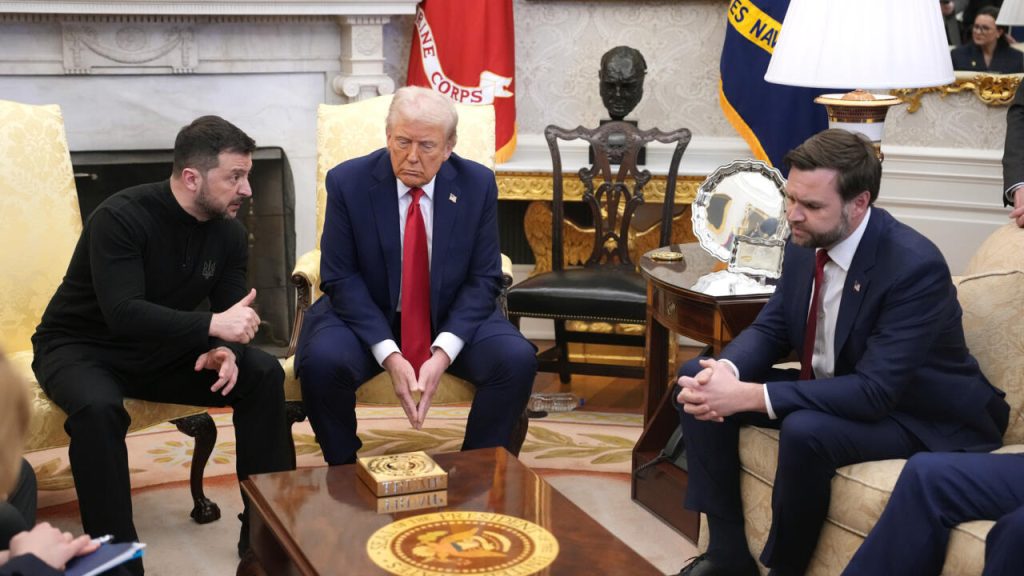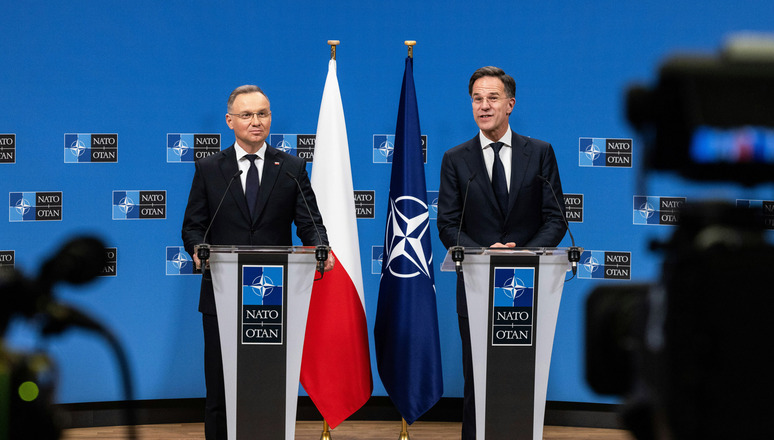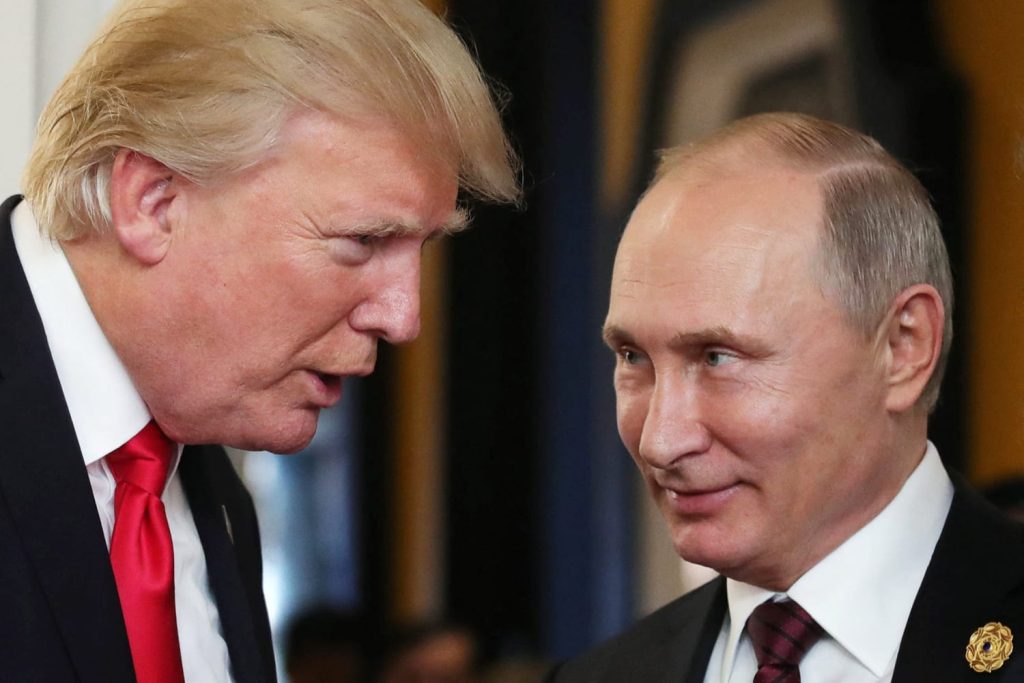What Would Happen if British, EU, or Ukrainian Intelligence Found Clear Evidence Donald Trump Was Working for Russia?
The question of whether U.S. President Donald Trump ever collaborated with Russia has been a subject of ongoing debate and investigation. If British, EU, or Ukrainian intelligence agencies were to uncover undeniable evidence of Trump’s active involvement with Russia, the repercussions would be significant, reshaping politics, law, and international relations on a global scale.
Trump's controversial comments about Russia, particularly his praise for President Vladimir Putin, add another layer of complexity to this issue. Such a revelation would have serious consequences for U.S. relations with its allies, domestic political dynamics, and the broader geopolitical environment.
Trump’s admiration for Putin has sparked ongoing debate throughout his presidency. He often referred to the Russian leader as "smart," "savvy," and "a genius." But what drives the former president to hold Putin in such high esteem?
This article delves into the factors behind Trump’s pro-Russia stance, exploring how his admiration for Putin’s authoritarian leadership style, personal interests, and alignment with certain American viewpoints may have shaped his views. It also examines the potential fallout if clear evidence emerged that Trump was working with Russia.
The Global Fallout: How British, EU, and Ukrainian Intelligence Would Respond
The discovery of clear evidence linking Donald Trump to Russia would lead to an international crisis, with major repercussions for key allies like the UK, the EU, and Ukraine.
The United Kingdom, a central member of the "Five Eyes" intelligence-sharing network, would be deeply affected by such a discovery. British intelligence agencies, including MI6 and GCHQ, cooperate closely with their U.S. counterparts.
The revelation that Trump was working for Russia would create a significant crisis of trust in U.S. leadership, particularly on matters of security and intelligence. British Prime Minister Rishi Sunak and other officials would likely face immense pressure to publicly denounce Trump's actions, potentially reevaluating the UK's defense priorities and its relationship with the U.S.
Britain might even reconsider its place in international defense organizations like NATO, as Trump’s alleged actions would undermine the credibility of U.S. leadership in countering Russia. Moreover, the UK might seek to strengthen its defense ties with other European powers and explore more independent security strategies.
The European Union, with its shared interests in countering Russian aggression, would face serious challenges. For years, the EU has relied on the United States to maintain a united front against Russian expansion, particularly since Russia’s annexation of Crimea in 2014.
If it were confirmed that Trump had been working with Russia, EU leaders would be forced to reconsider their diplomatic and defense strategies. The discovery could weaken the EU's confidence in NATO and U.S. leadership, possibly prompting European nations to reassess their defense posture.
Countries like France, Germany, and Poland, which have historically been key allies in the West’s fight against Russian influence, would likely seek alternative strategies to safeguard their interests. The U.S. might no longer be seen as a reliable partner, which could lead to a reconfiguration of European defense policies and alliances.
Ukraine, currently locked in a bitter war with Russia, would be devastated by the news that U.S. president had been working with Russia.
Ukrainian President Volodymyr Zelenskyy and his government have relied on U.S. military and intelligence support since Russia’s invasion in 2022. If British, EU, or Ukrainian intelligence agencies discovered Trump’s involvement with Russia, it would completely shatter Ukraine's trust in the United States.

Bully-boy tactics of Trump and J.D. Vance in the White House
Despite Trump’s controversial comments regarding Putin and Ukraine during his first term, U.S. military and intelligence support has been essential in Ukraine’s defense efforts. The collapse of that trust could force Ukraine to seek stronger partnerships elsewhere, possibly looking to European powers or even countries outside of the West to bolster its security efforts.
Political Fallout in the U.S.: What Would Happen Domestically?
If British, EU, or Ukrainian intelligence discovered Trump’s collaboration with Russia, it would send shockwaves through U.S. domestic politics. While Trump’s base remains loyal to him, the discovery of such evidence would create a profound legal, political, and constitutional crisis.
Impeachment and Legal Repercussions
If the evidence surfaced during Trump’s presidency, it would almost certainly trigger impeachment proceedings. The U.S. Constitution allows for impeachment in cases of “high crimes and misdemeanors,” which could include treason, conspiracy, or espionage with a foreign power.
Such an investigation would spark intense partisan battles. While Trump’s supporters would likely rally behind him, dismissing the evidence as part of a political attack, his critics would push for a full investigation and potential removal from office.
Even if Trump were no longer president, the legal ramifications would be severe.
Federal prosecutors would likely launch an extensive investigation into whether Trump violated national security laws, potentially leading to charges of espionage or other criminal acts. The Justice Department would be under tremendous pressure to ensure that such a breach of national security is fully investigated.
Possible Criminal Acts, Convictions, Penalties, and Prison Time
If clear evidence were found linking Donald Trump to criminal activity related to Russian collusion, several serious charges could be brought against him. Some of the key criminal offenses under U.S. law that might apply include:
-
Treason: The U.S. Constitution defines treason as "levying war against [the U.S.], or in adhering to their enemies, giving them aid and comfort." If Trump were proven to have been working with Russia to undermine U.S. interests, it could be considered an act of treason, which carries severe penalties, including imprisonment or even death in extreme cases, though a life sentence is more common.
-
Espionage: U.S. law prohibits the transmission of national defense information to foreign governments or groups. If Trump were found guilty of aiding Russian interests by providing classified information or collaborating with Russia to harm U.S. security, he could face charges of espionage, which carry penalties ranging from 10 years in prison to life in prison, depending on the severity of the offense.
-
Conspiracy: If Trump worked with others to coordinate actions that harmed U.S. national security or aided foreign enemies, he could face conspiracy charges. Penalties for conspiracy vary depending on the nature of the conspiracy, but they can include significant prison sentences, often ranging from 5 to 20 years.
-
Money Laundering: If evidence emerged that Trump or his associates had been financially benefiting from his alleged ties to Russia, money laundering charges could apply. Convictions for money laundering can result in long prison terms and substantial fines.
-
Obstruction of Justice: If Trump attempted to obstruct investigations into his activities, he could face additional charges for obstructing justice, which carry penalties ranging from fines to up to 20 years in prison, depending on the extent of the obstruction.
Should any of these charges be proven, Trump would face a lengthy and complex legal process, potentially leading to conviction. The penalties would vary depending on the specific charges, but the most severe could involve significant prison time. For example, a conviction on espionage or treason charges could result in decades in prison, potentially with life sentences as a real possibility.
Deepening Political Polarization
A revelation of this magnitude would only intensify the political polarization that has marked U.S. politics in recent years. Trump’s supporters would view any action taken against him as an unjust attack, deepening the partisan divide.
On the other hand, those who oppose Trump would see the evidence as confirmation of their worst fears about his ties to Russia, further energizing calls for accountability.
The public fallout would include bitter debates in Congress, with some politicians calling for immediate impeachment proceedings while others insist that Trump is being persecuted unfairly. The discovery could dominate political discourse in the U.S. for years to come, leaving the nation in a prolonged state of crisis.
Legal and Constitutional Ramifications: What Laws Would Trump Have Violated?
From a legal standpoint, the discovery of Trump’s collaboration with Russia would have far-reaching consequences. The U.S. Constitution permits the impeachment of a sitting president for "high crimes and misdemeanors," including treason. If it was proven that Trump had been collaborating with Russia, this would constitute a clear violation of U.S. law, specifically the espionage statutes.
Moreover, if Trump were found guilty of espionage or other national security violations, it could set a dangerous precedent for future U.S. presidents or high-ranking officials who may attempt to undermine national security for personal or political gain.
Additionally, the legal fallout could extend beyond Trump himself. If evidence were uncovered that others within his administration had been complicit, it could lead to widespread investigations into potential treasonous activity across multiple levels of government.
Geopolitical Repercussions: The Global Impact of Trump’s Alleged Ties to Russia
The global implications of such a revelation would be massive. The U.S. has long been viewed as the leading global power defending democratic values, and if it were proven that a U.S. president had been working in the interests of a foreign adversary, it would raise profound questions about the integrity of American democracy.
NATO and European Security
The discovery of Trump’s ties to Russia would rock NATO, the cornerstone of Western defense. If the U.S. was revealed to be compromised, other NATO members, especially those on Russia’s borders like Poland and the Baltic States, would be deeply concerned.
These countries depend heavily on U.S. leadership within NATO to counter Russian aggression. Should Trump’s actions undermine that leadership, NATO’s ability to respond to Russian threats might be weakened, forcing European nations to reconsider their own defense strategies.

NATO Secretary General Mark Rutte with Andrzej Duda, President of Poland
Some NATO members might look for new security alliances, reducing their reliance on the U.S. Meanwhile, Russia would likely exploit this new power vacuum to further its own strategic interests in Europe and beyond.
Russian Influence: A New Phase of Power Dynamics
If Trump’s ties to Russia were proven, it would embolden the Kremlin. Vladimir Putin’s ultimate goal has always been to undermine Western alliances, and such a discovery would be a major win for Russian influence.
However, this revelation could also spark internal instability within Russia, as ordinary citizens and political opponents of Putin might question how much influence the Kremlin truly had in U.S. politics.
In the short term, Russia might celebrate this victory, but the long-term consequences could include increased domestic scrutiny of Putin’s actions. If the Russian public sees the extent of its interference in U.S. political affairs, it could lead to political unrest within Russia.
China’s Response: An Opportunity for Geopolitical Expansion
China would be watching the fallout closely. The discovery that the U.S. was compromised by Russia could shift the balance of power in favor of Beijing. China has long sought to challenge U.S. global influence, and with American leadership now in question, Beijing could seize the opportunity to expand its geopolitical influence.
China could strengthen its relationship with Russia, further consolidating an alliance that could challenge U.S. dominance in global affairs. This shift in power dynamics would have far-reaching implications, particularly for global security, trade, and diplomacy.
Long-Term Impact on U.S. Democracy: A Permanent Shift in Public Trust
Finally, the long-term effects on American democracy would be significant. If a U.S. president was shown to have collaborated with a foreign power, it would shake the foundation of trust in U.S. political institutions.
Citizens would begin to question the integrity of the political system, and future leaders could face intense scrutiny over their ties to foreign powers.
The discovery would raise fundamental questions about accountability and transparency in government. The very fabric of U.S. democracy could be damaged, leaving future administrations grappling with the aftermath of one of the most significant political scandals in history.
The Reality of Trump’s Relationship with Russia
While some have speculated about the existence of compromising material on Trump, particularly following the “pee tape” allegations from the Steele dossier, the reality is far more straightforward.
Trump’s praise for Putin is not the result of external influence but rather reflects his personal political philosophy. He admires authoritarian figures who can maintain control, operate outside of democratic constraints, and project strength—qualities Putin exemplifies.
This admiration for Putin, however, does not mean Trump has created a formal alliance with Russia. Instead, it highlights a deeper ideological shift.
Trump’s pro-Russia stance is less about strategic political alliances and more about his personal alignment with Putin’s leadership style. In Trump’s eyes, the Russian president’s ability to negotiate from a position of strength is something to be respected—something Trump himself aspires to.
Breaking Down the U.S.-Russia Dynamic Under Trump
Despite Trump’s admiration for Putin, it’s crucial to recognize that he hasn’t formed a new alliance with Russia. Rather, he has created tension between the U.S. and its European allies, especially in relation to the ongoing conflict in Ukraine.
The United States has long been a guarantor of Europe’s security, but Trump’s rhetoric and actions—such as questioning NATO’s relevance and signaling support for Russia—undermine that traditional role.
This shift has significant implications for international relations. Trump’s foreign policy, shaped by his admiration for Putin’s approach to governance, has caused a rift between the U.S. and its allies, particularly in Europe. By distancing the U.S. from its traditional allies and embracing Putin’s worldview, Trump has weakened the unity that once defined the Western alliance.
The Political Landscape: Why Trump’s Views on Putin Matter
For many of Trump’s supporters, the admiration for Putin signals a deeper dissatisfaction with the American political system. They see a corrupt elite who has betrayed the working class, leaving the U.S. vulnerable and divided. In their view, Putin’s defiance of Western powers and his strongman leadership are qualities that reflect a fight against the very forces that have harmed American interests.
In contrast, U.S. support for Ukraine, particularly in its fight against Russia, has become a flashpoint. To Trump’s base, this support represents a betrayal of American priorities, further fueling their disillusionment with the political establishment.
For many, Putin’s willingness to challenge the West is a breath of fresh air, and Trump’s admiration for him reflects their own desire for strong, unapologetic leadership.
A Game-Changer for Global Politics
The revelation that Donald Trump had been working for Russia would of course send major shockwaves through U.S. politics, international relations, and global security.
The immediate collapse of trust with key allies like the UK, the EU, and Ukraine would reshape diplomatic and military alliances. Domestically, the U.S. would face an unprecedented political crisis, with impeachment proceedings, legal investigations, and an unprecedented level of public polarization.
The global geopolitical landscape would be permanently altered, with NATO’s credibility undermined and new power dynamics emerging, particularly between Russia, China, and the U.S. The long-term effects on American democracy could redefine how the world views U.S. leadership for decades to come.























